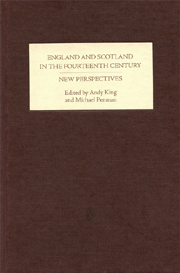Book contents
- Frontmatter
- Contents
- List of Contributors
- Acknowledgements
- Abbreviations
- 1 Introduction: Anglo-Scottish Relations in the Fourteenth Century – An Overview of Recent Research
- 2 The English Army and the Scottish Campaign of 1310–1311
- 3 ‘Shock and Awe’: The Use of Terror as a Psychological Weapon during the Bruce–Balliol Civil War, 1332–1338
- 4 The Scots and Guns
- 5 Edward Balliol: A Re-evaluation of his Early Career, c. 1282–1332
- 6 Scoti Anglicati: Scots in Plantagenet Allegiance during the Fourteenth Century
- 7 Best of Enemies: Were the Fourteenth-Century Anglo-Scottish Marches a ‘Frontier Society’?
- 8 Dividing the Spoils: War, Schism and Religious Patronage on the Anglo-Scottish Border, c.1332–c.1400
- 9 The Pope, the Scots, and their ‘Self-Styled’ King: John XXII's Anglo-Scottish Policy, 1316–1334
- 10 Sovereignty, Diplomacy and Petitioning: Scotland and the English Parliament in the First Half of the Fourteenth Century
- 11 National and Political Identity in Anglo-Scottish Relations, c.1286–1377: A Governmental Perspective
- 12 Anglici caudati: abuse of the English in Fourteenth-Century Scottish Chronicles, Literature and Records
- 13 Anglo-Scottish Relations in the Later Fourteenth Century: Alienation or Acculturation?
- Index
9 - The Pope, the Scots, and their ‘Self-Styled’ King: John XXII's Anglo-Scottish Policy, 1316–1334
Published online by Cambridge University Press: 12 September 2012
- Frontmatter
- Contents
- List of Contributors
- Acknowledgements
- Abbreviations
- 1 Introduction: Anglo-Scottish Relations in the Fourteenth Century – An Overview of Recent Research
- 2 The English Army and the Scottish Campaign of 1310–1311
- 3 ‘Shock and Awe’: The Use of Terror as a Psychological Weapon during the Bruce–Balliol Civil War, 1332–1338
- 4 The Scots and Guns
- 5 Edward Balliol: A Re-evaluation of his Early Career, c. 1282–1332
- 6 Scoti Anglicati: Scots in Plantagenet Allegiance during the Fourteenth Century
- 7 Best of Enemies: Were the Fourteenth-Century Anglo-Scottish Marches a ‘Frontier Society’?
- 8 Dividing the Spoils: War, Schism and Religious Patronage on the Anglo-Scottish Border, c.1332–c.1400
- 9 The Pope, the Scots, and their ‘Self-Styled’ King: John XXII's Anglo-Scottish Policy, 1316–1334
- 10 Sovereignty, Diplomacy and Petitioning: Scotland and the English Parliament in the First Half of the Fourteenth Century
- 11 National and Political Identity in Anglo-Scottish Relations, c.1286–1377: A Governmental Perspective
- 12 Anglici caudati: abuse of the English in Fourteenth-Century Scottish Chronicles, Literature and Records
- 13 Anglo-Scottish Relations in the Later Fourteenth Century: Alienation or Acculturation?
- Index
Summary
Discussions of papal involvement in the resolution of temporal disputes in the early fourteenth century have tended to emphasise the ineffectuality of the Holy See in enforcing its judgements and managing to evade accusations of partiality. When, in 1319, the pope ordered the Teutonic Knights to restore Pomorze to the Polish kingdom, the Order refused on the grounds that the ruling had been made by partisan judges-delegate. The potency of the pontiff's subsequent attempts to enforce the judgement was outweighed by the political and military strength of the Order in the region, coupled with its distance from Avignon. Attempts at papal intervention could be met with weapons from an increasingly sophisticated armoury belonging to the spokesmen of temporal rulers. The spiritual authority on which rested the right to intervene was seemingly no longer the preserve of the pontiff: the rhetoric of the ‘negotium terrae sanctae’ could be appropriated by any ruler – irrespective of their actual commitment to the cause, or of the military realities of Outremer. Moreover, it was a rhetoric by which papal policy itself might be judged in its dealings with temporal powers: the Declaration of Arbroath of 1320 famously urged the pope to act as an impartial father in adjudicating between warring nations, else the needless shedding of Christian blood would be the scandal of his reign, at a time when the borders of Christendom were continually threatened.
- Type
- Chapter
- Information
- England and Scotland in the Fourteenth CenturyNew Perspectives, pp. 157 - 171Publisher: Boydell & BrewerPrint publication year: 2007



